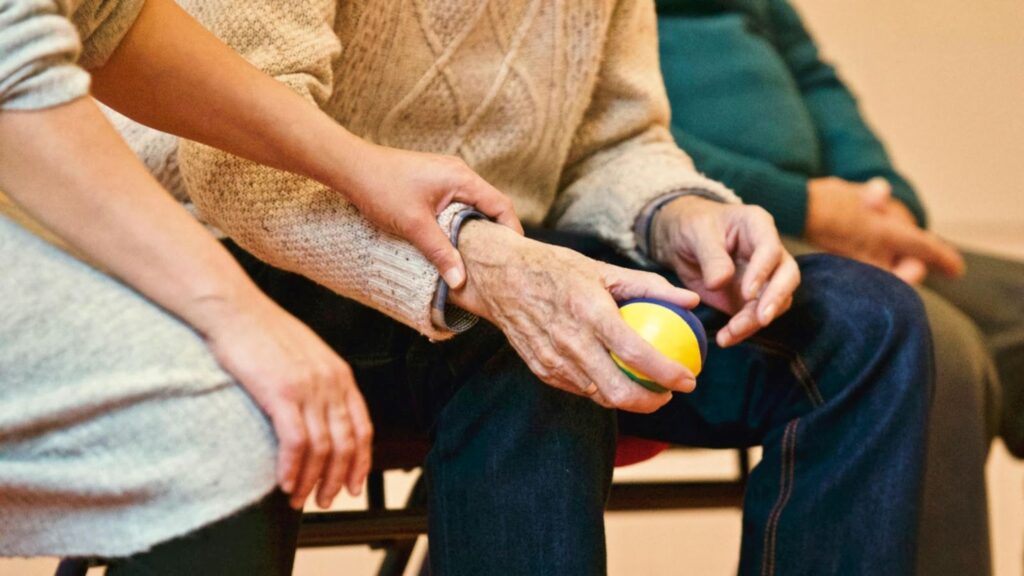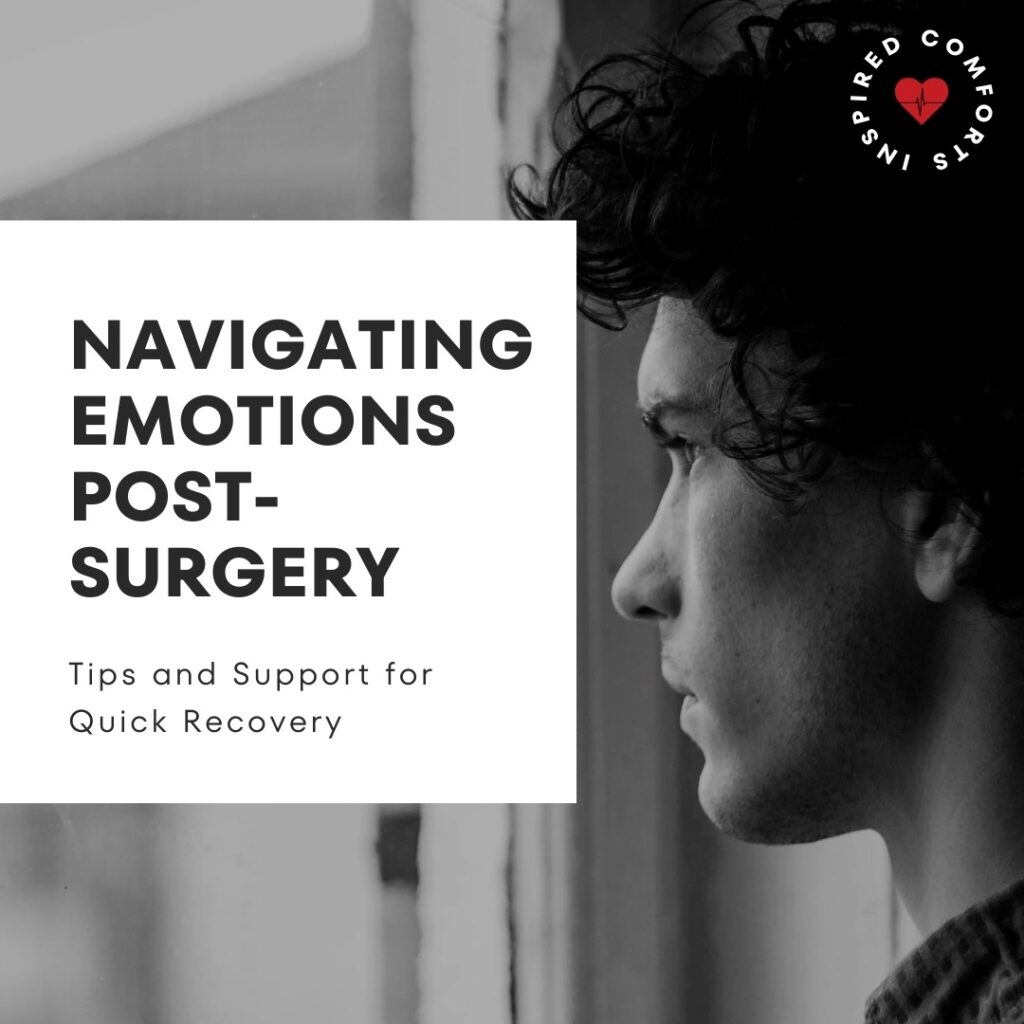Undergoing surgery can be a daunting experience, not just physically but emotionally as well. Addressing the emotional aspects of recovery is crucial for overall well being. This blog offers practical strategies and support to help navigate the emotional journey post-surgery.
Understanding Emotional Reactions
Common Emotional Responses to Surgery
It’s normal to feel a wide range of emotions after surgery, from relief that the procedure is over to anxiety about the recovery process. Post-surgery, many people experience sadness or frustration, especially if their mobility is limited. These feelings are a natural part of the healing process and acknowledging them is the first step towards managing them effectively.
- Relief and Gratitude: Many feel a sense of relief that the surgery is complete, and this can be accompanied by gratitude for successful medical care.
- Anxiety and Worry: Concerns about recovery, potential complications, and the impact on daily life can cause anxiety.
- Sadness and Frustration: Limited mobility or the need for assistance can lead to feelings of sadness and frustration.
- Irritability and Mood Swings: Pain, discomfort, and medication side effects can contribute to irritability and mood swings.
Understanding these emotional responses can help in coping better and seeking appropriate support when needed.
The Role of Anesthesia and Medications in Emotional Wellbeing
Anesthesia and pain medications, while crucial for physical recovery, can significantly affect mood and mental state. Be aware that these substances can cause mood swings, confusion, and even depression in some cases. Discuss any emotional side effects that you may experience with a licensed doctor to adjust medications if necessary and ensure emotional well-being.
Preparing for Emotional Recovery
Setting Realistic Expectations
Recovery is a gradual process, and setting realistic expectations can help manage frustration and maintain motivation. It’s normal to have good days and bad days. Setting small, achievable goals can help maintain positivity and motivation.
Building a Support Network
Having a strong support network is essential for emotional recovery. Reach out to friends and family who can offer emotional and practical support. Let them know how they can help, whether it’s as simple as driving to appointments or providing a listening ear.
Gathering Necessary Resources and Information
Educating yourself about what to expect during recovery can alleviate anxiety and help you feel more in control. Use informational booklets from your doctor or reputable online sources. Knowing what to expect can reduce anxiety and make the recovery process more manageable.
Immediate Post-Surgery Phase

Dealing with Initial Emotions
The first few days after surgery can be the toughest emotionally. It’s common to feel overwhelmed initially. Taking it one day at a time and focusing on small victories can make a big difference.
Importance of Comfy Clothes for After Surgery
Wearing comfy clothes for after surgery can significantly improve mood and comfort. Loose, soft clothing that’s easy to put on and take off is ideal. Many find relief in slipping into a cozy pair of sweatpants and a soft t-shirt, which can offer small comforts that make a big difference.
Practical Tips for Managing Pain and Discomfort
Effective pain management is crucial for emotional well-being. Pain and discomfort can severely impact your mood and overall mental health, so managing it effectively is essential for a smooth recovery. Here are some practical tips to help manage pain and discomfort effectively:
- Follow Medical Instructions:
- Medication Adherence: Adhering to your doctor’s guidelines for medication is critical. This ensures that you are using the most effective treatments for your condition and reduces the risk of complications or side effects. Always take your medication as prescribed and never hesitate to ask your healthcare provider if you have questions or concerns.
- Understand Your Medication: Make sure you understand how your medications work, the correct dosages, and any potential side effects. This knowledge can help you use them more effectively and safely.
- Stay on Schedule: Keep a medication schedule to ensure you take your pain relievers at the right times. Set alarms or use a medication management app to remind you when it’s time to take your next dose.
- Use Ice Packs and Heating Pads:
- Ice Packs: These can reduce inflammation and numb the area, providing relief from acute pain. Use an ice pack wrapped in a cloth to avoid direct contact with your skin and apply it for 15-20 minutes at a time.
- Heating Pads: Heating pads can soothe sore muscles and improve blood circulation, which helps in the healing process. Apply heat for 20 minutes at a time and ensure it is at a comfortable temperature to avoid burns.
- Incorporate Gentle Exercises:
- Stretching: Gentle stretching can prevent stiffness and improve mobility. Focus on areas that are prone to tension and follow your healthcare provider’s recommendations.
- Low-Impact Activities: Engage in low-impact activities like walking or swimming to keep your body moving without putting too much strain on it. These activities can help release endorphins, which are natural pain relievers.
- Physical Therapy: If recommended by your doctor, attend physical therapy sessions. A therapist can provide tailored exercises to help manage pain and improve your overall strength and flexibility.
- Mind-Body Techniques:
- Relaxation Techniques: Practices such as deep breathing, meditation, and progressive muscle relaxation can help manage stress and reduce pain. These techniques promote relaxation and can distract from discomfort.
- Visualization: Use guided imagery or visualization techniques to mentally escape from pain. Imagine yourself in a peaceful and pain-free place.
- Mindfulness: Practicing mindfulness can help you stay present and manage pain more effectively. Apps like Headspace or Calm offer guided mindfulness exercises.
- Maintain a Healthy Diet:
- Anti-Inflammatory Foods: Incorporate foods that have anti-inflammatory properties, such as leafy greens, nuts, and fatty fish, into your diet. These can help reduce inflammation and pain.
- Stay Hydrated: Drink plenty of water to stay hydrated. Proper hydration helps maintain overall health and can assist in pain management.
- Avoid Inflammatory Foods: Reduce the intake of foods that can cause inflammation, such as processed foods, sugary snacks, and alcohol.
- Create a Comfortable Environment:
- Ergonomic Support: Ensure that your home environment supports your recovery. Use ergonomic chairs and cushions to support your back and joints.
- Adjustable Bedding: Invest in a good mattress and adjustable pillows to ensure you get restful sleep. Proper sleep is crucial for pain management and overall recovery.
- Ambient Control: Maintain a comfortable room temperature and use soothing lighting to create a relaxing environment.
- Engage in Distraction Activities:
- Hobbies: Engage in hobbies that you enjoy and that can distract you from the pain. This could include reading, knitting, or watching movies.
- Social Interaction: Stay connected with friends and family. Positive social interactions can provide emotional support and distraction from pain.
- Monitor Your Progress:
- Pain Journal: Keep a pain journal to track your pain levels, triggers, and what methods provide relief. This can help you identify patterns and discuss them with your healthcare provider.
- Regular Check-Ups: Attend all follow-up appointments with your healthcare provider to monitor your recovery and adjust your pain management plan as needed.
Building a Support System

The Role of Family and Friends
A strong support system can make a significant difference in recovery. Having loved ones by your side can provide both emotional and practical support, which is crucial during the healing process. Loved ones can provide the emotional support needed to cope with recovery. Their presence can offer comfort, reduce feelings of isolation, and boost your spirits. Simple acts of kindness, such as listening, offering a hug, or just being there, can significantly impact your mental well-being. Family and friends can assist with daily tasks and offer companionship. This might include cooking meals, helping with household chores, or providing transportation to medical appointments. Their assistance can alleviate some of the physical burdens of recovery, allowing you to focus on healing.
Professional Support: Therapists and Support Groups
Recovery can be an emotional journey, and sometimes professional help is necessary to navigate the complex feelings that arise.
- Therapists can offer coping strategies and a safe space to express feelings. They are trained to help you work through emotional challenges and develop strategies to manage stress, anxiety, and depression. Regular sessions can provide a structured environment to discuss your progress and setbacks. Support groups, either in-person or online, can connect individuals with others going through similar experiences.
- Support Groups can connect you with others going through similar experiences. Sharing your journey with others who understand can be incredibly validating and comforting. Support groups provide a sense of community and the opportunity to learn from others’ experiences and coping mechanisms.
Online Communities and Resources
In today’s digital age, numerous online platforms can provide support and information during your recovery. Websites, forums, and social media groups dedicated to post-surgery recovery can provide advice, encouragement, and a sense of community. Platforms like Reddit, Facebook groups, and specialized health forums allow you to connect with others, share your experiences, and seek advice. This virtual support network can be particularly beneficial if you feel isolated or need quick answers to your questions.
Practical Coping Strategies
Mindfulness and Relaxation Techniques
Practicing mindfulness and relaxation can help manage stress and anxiety. These techniques are simple yet powerful tools that can improve your mental health during recovery. Techniques such as deep breathing, meditation, and progressive muscle relaxation can be very effective. They help calm your mind, reduce stress, and improve your overall sense of well-being. Incorporating these techniques into your daily routine can provide a much-needed mental break and promote relaxation.
Apps and online videos can guide you through these practices. Platforms like Headspace, Calm, and YouTube offer guided meditations and relaxation exercises tailored to different needs and preferences.
Physical Activity and Its Impact on Emotional Recovery
Gentle physical activity, as recommended by a doctor, can boost mood and energy levels. Staying active during recovery is important for both physical and mental health. Activities like walking or stretching release endorphins, the body’s natural mood lifters. These endorphins can help reduce pain and improve your mood, making it easier to cope with the challenges of recovery. Slowly increasing physical activity can help improve both physical and mental health.
Start with gentle exercises and gradually build up your strength and endurance as recommended by your healthcare provider. This progression can help you feel more capable and resilient.
Creative Outlets: Art, Music, and Writing
Engaging in creative activities can be a great way to express emotions and distract from discomfort. Creativity can be a powerful therapeutic tool during recovery.
Creative activities like painting, playing an instrument, or journaling can be therapeutic and enjoyable. These activities provide a constructive outlet for expressing emotions, reducing stress, and enhancing your mood. They can also serve as a pleasant distraction from pain and discomfort.
Get Well Soon Gifts After Surgery

How Thoughtful Gifts Can Boost Morale
Thoughtful gifts can have a profound impact on your emotional well-being during recovery. Receiving get-well-soon gifts after surgery can lift spirits and make one feel loved and cared for. A thoughtful gift can brighten even the darkest days of recovery. Whether it’s a small token of appreciation or a more elaborate present, knowing that someone cares can make a big difference.
Ideas for Meaningful and Supportive Gifts
- Comfortable and Practical Gifts:
- Soft Blankets: Cozy and warm blankets can provide comfort and relaxation, making recovery more pleasant.
- Books: Engaging books can offer an escape and entertainment, helping to pass the time.
- Gift Cards for Streaming Services: Subscriptions to Netflix, Hulu, or other streaming platforms can provide endless entertainment options.
- Comfortable Clothing: Soft, easy-to-wear clothing, such as pajamas or loungewear, can enhance comfort during recovery.
- Personalized Gifts:
- Homemade Meals: Preparing and delivering homemade meals can show care and support. Consider dietary restrictions and preferences to make the meals even more thoughtful.
- Handwritten Notes: A heartfelt note can offer emotional support and encouragement. Express your thoughts and wishes for a speedy recovery in a personal letter.
- Custom Care Packages: Assemble a care package with the recipient’s favorite snacks, magazines, and small comforts. Personalizing the contents shows extra thought and consideration.
- Wellness and Self-Care Gifts:
- Aromatherapy Diffusers: Essential oil diffusers can create a calming atmosphere and help reduce stress.
- Spa Kits: Gift sets with bath bombs, lotions, and other spa products can encourage relaxation and self-care.
- Meditation and Relaxation Apps: Subscriptions to mindfulness or meditation apps like Headspace or Calm can support mental well-being.
- Entertainment and Hobby Supplies:
- Puzzles and Games: Jigsaw puzzles, board games, or card games can provide entertainment and mental stimulation.
- Art Supplies: Drawing or painting kits can offer a creative outlet and therapeutic activity.
- Music: Create a playlist or gift a subscription to a music service like Spotify or Apple Music to provide a soothing and enjoyable experience
- Practical Gifts:
- Reusable Water Bottles: Staying hydrated is important for recovery, and a high-quality, reusable water bottle can be both practical and thoughtful.
- Travel Pillows and Blankets: Compact and comfortable pillows and blankets can make resting easier, especially for those recovering at home.
- Organizational Tools: Planners, journals, or even an electronic organizer can help keep track of medications, appointments, and daily activities.
- Thoughtful Gestures:
- Plants and Flowers: A potted plant or a bouquet of flowers can brighten up the recovery space and lift spirits.
- Photo Albums: Create a photo album or scrapbook with cherished memories to remind the recipient of happy times and supportive relationships.
- Volunteer Help: Offer to help with chores, errands, or other tasks. Your time and effort can be incredibly valuable and appreciated.
After Surgery Clothes and Comfort

Choosing the Right Clothing for Comfort and Recovery
What you wear during recovery can significantly affect your comfort and overall well-being. Selecting the right after surgery clothes is essential for comfort and ease of movement. Look for loose, soft clothing that is easy to put on.
Comfortable clothes reduce irritation and allow for better movement, which is crucial during recovery. Clothing with drawstrings or elastic waistbands and front-opening tops are ideal. These features make it easier to dress and undress, especially when dealing with limited mobility or post-surgery wounds. Avoid anything with tight bands or complicated fastenings.
Many patients find that changing into comfortable clothing, such as a set of soft pajamas, can make them feel more relaxed and less irritable. Simple changes can significantly affect mood and comfort.
Long-Term Emotional Wellbeing
Recognizing Signs of Depression or Anxiety
Monitor your emotional health and recognize signs of depression or anxiety. It’s important to be aware of your mental state during recovery. Persistent sadness, loss of interest in activities, and changes in sleep patterns are all concerning behaviors. Recognizing these signs early can help you seek the necessary support before the situation worsens.
Strategies for Maintaining Emotional Health
Maintaining a routine and staying connected with loved ones can support emotional well-being. Consistency and social interactions are key to a healthy mind.
- Daily Routine: Establishing a routine can provide structure and a sense of normalcy. Regular activities and schedules help anchor your day and reduce feelings of aimlessness. Even simple tasks like showering, dressing, and eating regular meals can help maintain control and grounding.
- Scheduled Relaxation: Include time for relaxation and self-care in your routine. Activities like reading, taking a bath, or listening to music can help you unwind and reduce stress.
- Goal Setting: Set small, achievable goals for each day. This can provide a sense of accomplishment and keep you motivated.
- Consistency: Try to wake up and go to bed at the same time every day to regulate your body’s internal clock.
- Staying Active: Engaging in hobbies and getting outside for fresh air can boost mood. Physical activity and exposure to nature can significantly enhance your emotional well-being.
- Exercise: Incorporate regular physical activity into your routine. Even light exercises like walking, stretching, or yoga can improve your mood and energy levels.
- Gardening: Spending time in a garden can be therapeutic and provides the benefit of being outdoors.
- Creative Activities: Engage in creative hobbies like painting, knitting, or playing a musical instrument. These activities can be very fulfilling and provide a productive outlet for your emotions.
- Volunteer Work: If possible, volunteer your time to help others. This can provide a sense of purpose and connection to your community.
- Social Interaction: Maintaining connections with loved ones can offer emotional support and enhance your sense of belonging.
- Regular Check-ins: Schedule regular calls or video chats with family and friends. This can help you stay connected and provide emotional support.
- Join Groups: Participate in online or local community groups that share your interests. This can provide a sense of community and reduce feelings of isolation.
- Support Networks: Lean on support groups for people going through similar experiences. Sharing your journey with others can be incredibly validating and comforting.
- Mental Health Activities: Incorporate activities specifically aimed at improving mental health.
- Mindfulness Practices: Engage in mindfulness exercises such as meditation, deep breathing, or progressive muscle relaxation. These practices can help manage stress and improve mental clarity.
- Journaling: Write down your thoughts and feelings regularly. Journaling can be a powerful tool for processing emotions and reflecting on your progress.
- Therapy: Consider speaking with a mental health professional if you feel overwhelmed. Therapists can offer strategies and support tailored to your needs.
- Music Therapy: Listening to or playing music can be incredibly soothing and can help manage stress and anxiety. Music has a unique ability to uplift moods and evoke positive emotions.
- Healthy Eating: Nutrition plays a significant role in emotional well-being. Eating a balanced diet rich in fruits, vegetables, lean proteins, and whole grains can positively impact your mood and energy levels. Avoid excessive caffeine and sugar, which can lead to mood swings and energy crashes.
When to Seek Professional Help
Identifying When Emotional Reactions Are Beyond Normal
If emotions become overwhelming or persistent, it may be time to seek professional help. It’s crucial to know when to reach out for additional support. Don’t hesitate to reach out to a mental health professional if you’re struggling. Professional guidance can provide the tools and support needed to manage your emotions effectively.
Finding the Right Mental Health Professional
Finding the right professional can make a big difference in your recovery. Look for a therapist or counselor who specializes in post-surgical recovery or trauma. Doctors can often provide referrals, and online directories can help find the right professional. Take the time to research and choose someone who meets your specific needs.
Experiences with Professional Support
Patients often report significant improvements in emotional well-being after working with a therapist. Professional support can be a crucial part of recovery. Professional help can provide effective coping strategies. Therapists can offer personalized advice and techniques to help you navigate the emotional challenges of recovery.
Recovering from surgery is not just about physical healing; emotional recovery is equally important. By setting realistic expectations, building a strong support network, and practicing effective coping strategies, it’s possible to navigate this challenging time with greater ease. Prioritizing emotional wellbeing and seeking help when needed are crucial steps in this journey. Remember, support is available to help through this process.







